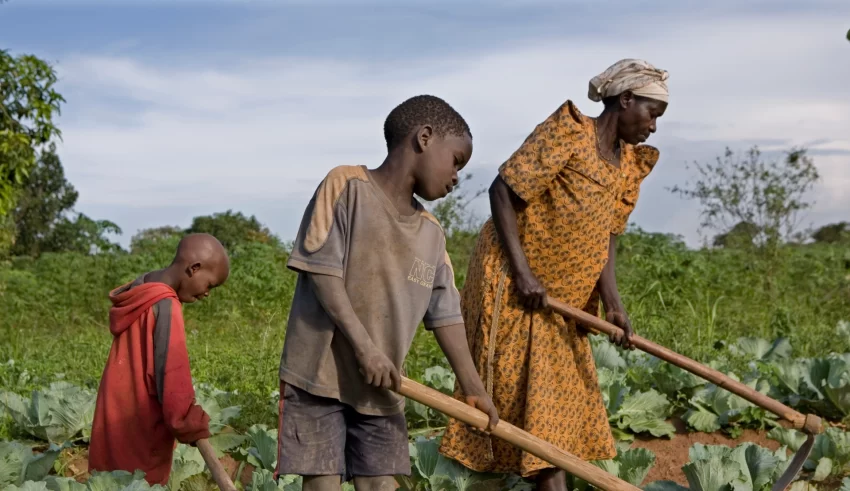
Contemporary issues such as the Ukrainian and Russian war, climate change, Covid-19 pandemic have shaken up the global food security system. It made everyone aware of the high level of dependency on basic sustainable items from foreign countries. The level of impact was the disruption of the global food supply chain. However, can an opportunity come out of such a crisis? This article analyses the prospect of agribusiness in African nations to become reliable for global food security, this is done by looking at mechanisms that the European Union (EU) and the African Union (AU) could apply in order to make this possible.
For the past year, there have been continuous efforts by the EU to ensure global food security action has taken place, so far there is a major focus on aiding EU farmers and foreign cooperation to ensure investments with the AU. Looking beyond the European borders to find a better and more sustainable solution would be deemed necessary given the urgency of the matter at hand. The EU has used the Common Agricultural Policy (CAP), with the objective to have access to sufficient, safe and nutritious food for all, yet this is a policy solely for EU countries. However, the EU could be able to incorporate a policy such as CAP for non-EU countries. A way through would be to incorporate the Global Gateway Plan which is an economic and investment plan that focuses outside the EU border. With this external action, there is a chance to plan out investment in the African continent. In the EU-AU Summit of February 2022, the EU promised an investment of €150 billion by 2027, under the Global Gateway Strategy.[1] This strategy is able to facilitate trade and mobility between the EU and AU. In this light, there could be an opening to invest towards agribusiness as a reliable form to maintain food security as there would be a great fostering of economic growth.
Agribusiness becomes an essential form to fight against food insecurity because it guarantees a continuous production that meets the global need. Not only that, but also allows the accessibility of farmers to the economic market empowering them to have better agricultural production. In order for agribusiness to be efficient in maintaining food security there needs to be consideration of methods to way to maintain affordability, availability, quality and safety, plus sustainability and adaptation. Hence, there is a need to keep sustaining and viable food system that ensures agricultural chains are supported. Taking this into account is necessary because there are bigger chances to focus on innovative methods with countries that have already showed positive results in meeting all requirements for food security. In this vein, it is imperative to grant business opportunities via agribusiness for development.
Some countries have demonstrated to be highly efficient in production and ensuring food security for their own population. For example, in 2022 South Africa was the first ever sub-Saharan country to be listed as the top 10 food-secure countries in Africa.[2] Also, Ethiopia has shown great levels of cereal production. The secret was not only based on the primary production focus of these countries but the ability to invest in agribusinesses. For instance, Ethiopia is one of the biggest cereal producers in Africa,[3] there are large volumes being produced and exported. Although Africa is a net importer of food, a country such as Ethiopia has taken advantage of its agricultural production and process industry and ensured to grow within this ambit.
Moreover, South Africa stands as one of the countries with major fields for agriculture in Africa, with over 96 million hectares.[4] There is high potential but the country has the lowest GDP that is generated in agriculture, be this as it may, the country has the most number of agribusiness companies who have taken initiatives to maintain the level of sustainability with fewer imports of food.[5] One of its secrets is the continuous investments in businesses including agricultural value and persisting in making sure that their farmers are included in the market. The important thing to see from primary production countries is how they are in need of innovative methods to keep producing in a sustainable manner. This is where the EU could use the Global Gateway strategy to invest in innovative agricultural production methods that would be done in African countries with the highest potential to ensure food security as trade is facilitated between the EU and AU.
From these countries, it is possible to see how large scale agribusinesses are essential to develop larger food supply chains that will end up meeting the global demand. To fight against food insecurity the efforts should be directed to the developments in the areas of agriculture to ensure that there is a maintenance of sustainability for future generations. In lieu of this crisis, the EU can invest in areas that are capable of high production and thus ensure a trade line between the EU and African nations that can produce in high volumes. Thus, this may become a valid solution, if there is need not only for investment but continuous development on regulatory frameworks and development of infrastructures. This exchange would enrich both the EU and the African region by using this strategy that is already capable to deepen further development.
There can be a way forward that would enable all participating countries to assure that food insecurity is not widely spread, and that this current crisis can give birth to new collaborating and engaging opportunities, as Winston Churchill said: “never waste a good crisis”.
[1] https://african.business/2022/11/trade-investment/eu-reveals-details-of-150bn-global-gateway-plan-for-africa/
[2] https://impact.economist.com/sustainability/project/food-security-index/
[3] https://www.statista.com/statistics/1265139/agriculture-as-a-share-of-gdp-in-africa-by-country/#:~:text=South%20Africa%20and%20Nigeria%20are,terms%20of%20products%20and%20volume.
[4] https://www.statista.com/topics/9876/agriculture-in-south-africa/#topicOverview
[5] https://www.asokoinsight.com/content/market-insights/africa-s-largest-agribusiness-companies
By The European Institute for International Law and International Relations.















